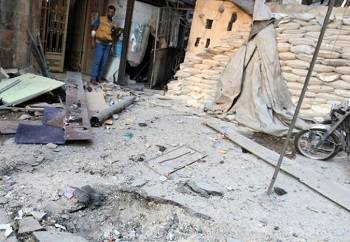The US has threatened to suspend cooperation with Russia over Syria, hours after the bombardment of two hospitals in opposition-held areas of Aleppo, as Syrian regime forces backed by Moscow continued their offensive to retake the eastern part of the city from opposition fighters.
US Secretary of State John Kerry warned his Russian counterpart Sergey Lavrov on Wednesday that Washington would end talks on the conflict, as well as a military pact that involves targeting the ISIL and Jabhat Fateh al-Sham groups unless Moscow halted the assault on Aleppo.
Kerry conveyed the message in a call to Lavrov in which he voiced "grave concern" over the Russian-backed Syrian regime's air and land attacks on the besieged city that has left more than 400 people killed and at least 1,700 wounded since last week.
"The United States is making preparations to suspend US-Russia bilateral engagement on Syria ... unless Russia takes immediate steps to end the assault on Aleppo and restore the cessation of hostilities," said John Kirby, spokesman for the State Department.
Kerry also said the US held Russia responsible for the use of incendiary and bunker buster bombs which put Aleppo civilians at great risk, according to Kirby.
On Thursday, Sergei Ryabkov, Russia's Deputy Foreign Minister referred to US statements on Syria as tantamount to supporting terrorism.
Ryabkov was referring to a statement made by US State Department spokesman John Kirby who said on Wednesday “that Russia had an interest in stopping the violence in Syria because extremists could exploit the vacuum there and launch attacks against Russian interests, perhaps even Russian cities."
Ryabkov was quoted as saying the statement was "an emotional outburst."
He also said a seven-day ceasefire plan proposed for Syria by the United States was unacceptable for Russia and that Moscow was proposing a 48-hour "humanitarian pause" in the city of Aleppo instead.
The Syrian regime's offensive to recapture all of Aleppo - with Russian air support and Iranian help on the ground - has been accompanied by bombing that residents have described as unprecedented in its ferocity.
An estimated 250,000 people still live in the east, which has been under near-continuous siege since mid-July, causing food and fuel shortages. Attacks on water installations from both sides have left more than two million civilians without water.
Solution 'no longer viable'
Russia's defence ministry said later on Wednesday that Moscow was prepared to relaunch talks with the US on the crisis.
"On orders of the Russian president, we are ready to continue joint work with our American partners on the Syrian issue," and to send experts to Geneva to "relaunch consultations," the ministry said.
However, Muwaffaq Nyrabia, a senior member of the National Coalition, a Syrian opposition movement, said the escalating violence meant a political solution was "no longer viable".
He said that the opposition forces were "considering all options to defend the Syrian people against the Russian aggression on Syria".
Nyrabia's comments came shortly after six civilians were killed when air strikes hit two hospitals in Aleppo.
The M10 and M2 hospitals were hit before dawn, forcing both to shut temporarily, and leaving just two of east Aleppo's eight hospitals with surgical facilities.
Al Jazeera's diplomatic editor, James Bays, asked Syria's UN Ambassador Bashar Jaafari if his country had bombed the two hospitals. Jaafari walked away laughing without an answer.
"It's not clear why he was laughing considering his country is being accused of war crimes in Aleppo," Bays said.
The latest bombardment has been some of the worst in Syria's five-year war, and comes after the failure of a short-lived ceasefire brokered by Russia and the US this month.
'Opportunity to escape'
Meanwhile, the head of the White Helmets volunteer rescue force, which operates in opposition-held territory in northern Syria, said that under current conditions civilian facilities in eastern Aleppo would no longer be able to function within a month.
"The civilians there would seize any opportunity to escape, to go wherever they could go," Raed Saleh told AFP news agency.
"But nothing is available to provide safety and protection for those civilians."
The Syrian war started as a largely unarmed uprising against Assad in March 2011, but quickly escalated into a full-blown armed conflict.
Five years on, more than 400,000 Syrians are estimated to have been killed, and almost 11 million Syrians - half the country's prewar population - have been displaced from their homes.
PHOTO CAPTION
A man inspects the damage outside a field hospital after an airstrike in the opposition-held al-Maadi neighborhood of Aleppo, Syria, September 28, 2016. REUTERS
Al-Jazeera


 Home
Home Discover Islam
Discover Islam Quran Recitations
Quran Recitations Lectures
Lectures
 Fatwa
Fatwa Articles
Articles Fiqh
Fiqh E-Books
E-Books Boys & Girls
Boys & Girls  Articles
Articles










